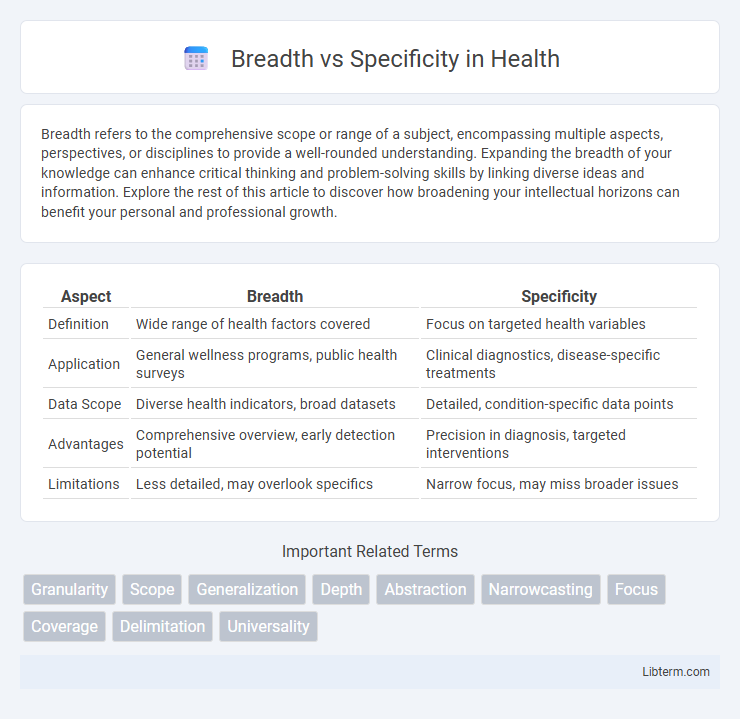Breadth refers to the comprehensive scope or range of a subject, encompassing multiple aspects, perspectives, or disciplines to provide a well-rounded understanding. Expanding the breadth of your knowledge can enhance critical thinking and problem-solving skills by linking diverse ideas and information. Explore the rest of this article to discover how broadening your intellectual horizons can benefit your personal and professional growth.
Table of Comparison
| Aspect | Breadth | Specificity |
|---|---|---|
| Definition | Wide range of health factors covered | Focus on targeted health variables |
| Application | General wellness programs, public health surveys | Clinical diagnostics, disease-specific treatments |
| Data Scope | Diverse health indicators, broad datasets | Detailed, condition-specific data points |
| Advantages | Comprehensive overview, early detection potential | Precision in diagnosis, targeted interventions |
| Limitations | Less detailed, may overlook specifics | Narrow focus, may miss broader issues |
Understanding Breadth vs Specificity
Understanding breadth versus specificity is essential for effective decision-making and learning strategies. Breadth involves acquiring a wide range of knowledge or skills across multiple areas, fostering adaptability and broad perspectives. Specificity, by contrast, emphasizes deep expertise in a focused domain, enabling precision and mastery that drive innovation and specialized problem-solving.
Definitions and Core Concepts
Breadth refers to the wide scope or range of topics covered, offering a general overview and multiple perspectives. Specificity denotes a narrow, detailed focus on a particular subject, emphasizing precise information and depth. Understanding the balance between breadth and specificity is crucial for effective knowledge acquisition and communication strategies.
Advantages of Breadth in Knowledge or Skills
Breadth in knowledge or skills enables professionals to adapt swiftly across diverse tasks and industries, enhancing problem-solving versatility. A broad skill set fosters interdisciplinary innovation by integrating concepts from multiple fields, promoting creative solutions. Exposure to varied subjects cultivates strong communication abilities, facilitating collaboration across teams and roles.
Benefits of Specificity and Specialization
Specialization enhances expertise by allowing individuals or businesses to focus on a narrow area, leading to higher quality and efficiency. Specificity enables tailored solutions that directly address unique needs, resulting in improved customer satisfaction and competitive advantage. Concentrated knowledge and skills foster innovation and deeper understanding within a specialized domain.
Challenges of Broad vs Narrow Approaches
Broad approaches often face challenges such as diluted focus and resource allocation inefficiencies, making it difficult to achieve depth in any single area. Narrow approaches, while offering deep expertise and precision, risk missing opportunities and having reduced adaptability in dynamic environments. Balancing breadth and specificity requires strategic prioritization to optimize impact without sacrificing agility or comprehensive coverage.
Breadth vs Specificity in Career Development
Career development requires balancing breadth versus specificity to maximize growth and adaptability. A broad skill set enhances versatility and opens diverse opportunities across industries, while specific expertise builds deep proficiency critical for specialized roles. Professionals who strategically integrate both breadth and specificity tend to achieve sustained career advancement and resilience in dynamic job markets.
Real-World Examples: Generalists and Specialists
Generalists thrive in diverse environments by applying broad skill sets across multiple domains, exemplified by product managers who coordinate cross-functional teams. Specialists excel through deep expertise in niche areas, such as cybersecurity analysts who protect complex digital infrastructures with advanced knowledge. Companies benefit from balancing breadth and specificity by integrating generalists' adaptability with specialists' precision for innovative problem-solving.
Choosing the Right Approach: Factors to Consider
Selecting the right approach between breadth and specificity depends on factors such as target audience, resource availability, and desired outcomes. Breadth facilitates reaching a wider market and exploring diverse opportunities but may dilute focus and effectiveness in niche areas. Specificity enhances expertise and relevance to a specialized segment, improving conversion rates and customer loyalty within that market.
Balancing Breadth and Specificity for Success
Balancing breadth and specificity is crucial for success, as a broad knowledge base enables adaptability while specific expertise drives deep problem-solving. Focusing solely on breadth may result in superficial understanding, whereas excessive specificity can limit flexibility and innovation. Integrating both approaches ensures comprehensive insight and targeted competence for optimal performance.
Future Trends: Evolving Demands for Breadth and Specificity
Future trends indicate a growing demand for balanced expertise combining breadth and specificity, driven by rapidly evolving industries like AI and biotechnology. Professionals with broad foundational knowledge and specific technical skills are increasingly valued to navigate complex, interdisciplinary challenges. Educational models and workforce training programs are adapting to emphasize both wide-ranging understanding and deep specialization to meet market needs.
Breadth Infographic

 libterm.com
libterm.com